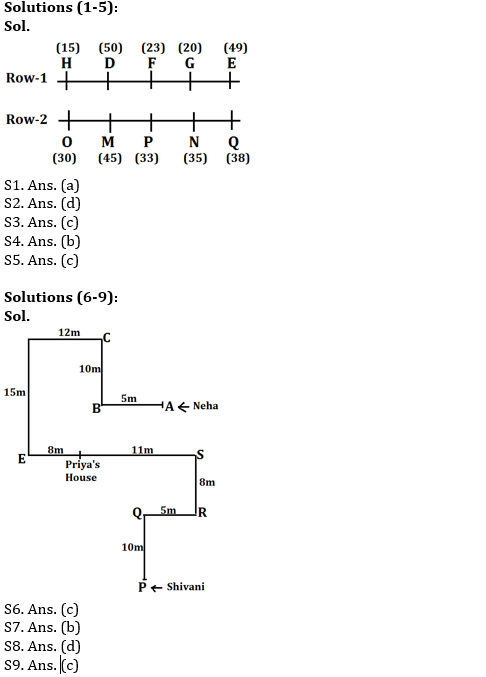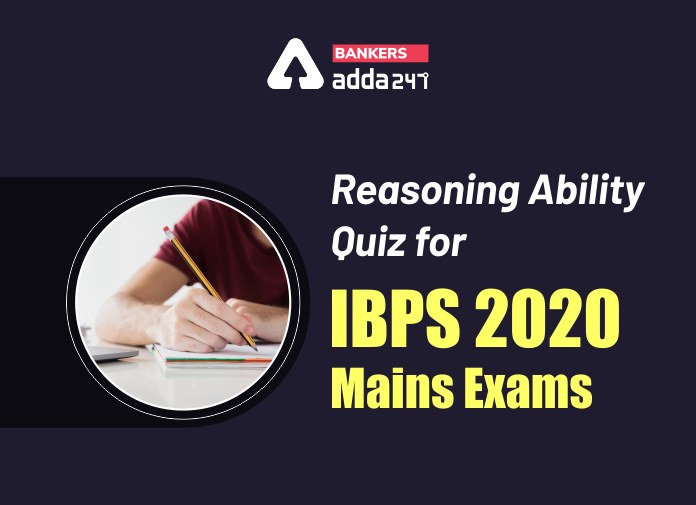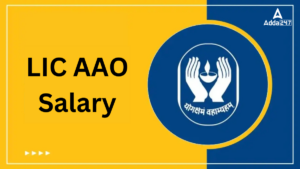Table of Contents
Direction (1-5): Read the following information carefully and answer the questions: Ten persons are sitting in two rows, such that in row-2 M, N, O, P, Q are sitting and facing in north direction and in row-1 D, E, F, G, H are sitting and facing in south direction. Each person of row-1 facing each person of row-2. All of them are of different ages 15, 20, 23, 30, 33, 35, 38, 45 ,49, 50 but not in the same order. There are two people sitting between M and Q and either M or Q is sitting at one of the extreme ends. G is 20 years old and sits third to the left of H. Neither H nor F sits opposite to M and Q, who is not the oldest. No two persons are sitting together according to alphabetical order, except G and F. The age of P is a multiple of 11. G sits opposite to N whose age is a multiple of 7. Two persons sits between the one who is the youngest and the one who sits opposite to the one whose age is 35. Three persons sit between the one whose age is 49 and the one who is the youngest. O’s age is twice the age of H. The age of the person who is facing the person who is sitting 2nd to the left of Q is a prime number. The age of M is equal to the sum of ages of H and O. Only one person is sitting between H and F.
Q1. What is the age of F?
(a) 23 years
(b) 30 years
(c) 45years
(d) 15 years
(e) None of these
Q2. Who among the following is the oldest?
(a) H
(b) O
(c) E
(d) D
(e) None of these
Q3. Who among the following sits to the immediate left of E?
(a) P
(b) O
(c) No one
(d) H
(e) None of these
Q4. Which of the following combination is true regarding the given arrangement?
(a) E- 50
(b) M- 45
(c) F- 33
(d) D- 49
(e) None of these
Q5. Who among the following is 33-year-old?
(a) H
(b) G
(c) P
(d) E
(e) None of these
Direction (6-9): Study the following information carefully and answer the questions given below: Two friends Neha and Shivani go to their friend Priya’s house. Neha start walking from point A to the west direction and walks 5m to reach at point B. From point B she takes a right turn and walks 10m to reach at point C, then takes two consecutives left tuns and walks 12m and 15m to reach at point E, then finally takes a left turn and walks 8m to reach Priya’s house. Shivani starts walking from point P in north direction and walks 10m to reach at point Q, then turn in east direction and walks 5m to reach at point R. From point R she takes a left turn and walks 8m to reach at point S. From point S she walks in west direction and walks 11m to reach Priya’s house.
Q6. What is the shortest distance between point Q and Priya’s house?
(a) 15m
(b) 11m
(c) 10m
(d)7m
(e) None of these
Q7. What is the direction of point A with respect to point P?
(a) South
(b) North-east
(c) South-west
(d) North
(e) None of these
Q8. What is the direction and shortest distance of Priya’s House with respect to point B?
(a) 8m, North-east
(b) √21m, South-east
(c) 10m, North
(d) √41m, South-west
(e) None of these
Q9. What is the direction of point R with respect to point C?
(a) South-west
(b) North-east
(c) South-east
(d) North-west
(e) None of these
Directions (10-12): In these questions, relationship between different elements is shown in the statements. The statements are followed by conclusions. Study the conclusions based on the given statements and select the appropriate answer. Give answer- (a) If only conclusion I is true (b) If only conclusion II is true (c) If both conclusions I and II are true. (d) If either conclusion I or II is true (e) If neither conclusion I nor II is true.
Q10. Statements: J<O=B>M, A>Q<J, I≤M.
Conclusions: I. A>M II. O>I
Q11. Statements: S<Z, R≥C≤Z, Q>S, C>K.
Conclusions: I. R>Q II. K<R
Q12. Statements: Q>M, J=R, J<Q>S≤A
Conclusions: I. R>M II. R≤M
Directions (13-15) : Each of the following questions consists of a statement followed by two arguments I and II. Give answer (a) if only argument I is strong (b) if only argument II is strong (c) if either I or II is strong (d) if neither I nor II is strong (e) if both I and II are strong.
Q13. Statement: Should officers accepting bribe be punished?
Arguments: I. No. Certain circumstances may have compelled them to take bribe.
II. Yes. They should do the job they are entrusted with, honestly.
Q14. Statement: Should India become a permanent member of UN’s Security Council?
Arguments: I. Yes. India has emerged as a country which loves peace and amity.
II. No. Let us first solve problems of our own people like poverty, malnutrition.
Q15. Statement: Should the persons below the age of 18 years be allowed to join armed forces?
Arguments: I. No. Persons below the age of 18 do not attain both physical and mental maturity to shoulder such burden. II. Yes, this can makes our army more powerful.
Practice More Questions of Reasoning for Competitive Exams:
Solutions


Download PDF of this Reasoning Quiz for IBPS Mains 2020
Practice with Crash Course and Online Test Series for IBPS Mains 2020:
- IBPS RRB PO and Clerk Prime 2020-21 Online Test Series
- IBPS PO Online test series (Prelims + Mains) 2020 by Adda247
- IBPS KA MAHAPACK Online Live Classes
Click Here to Register for Bank Exams 2020 Preparation Material
If you are preparing for IBPS Mains Exam, then you can also check out a video for Reasoning below:




 GA Capsule for SBI Clerk Mains 2025, Dow...
GA Capsule for SBI Clerk Mains 2025, Dow...
 The Hindu Review October 2022: Download ...
The Hindu Review October 2022: Download ...
 LIC AAO Salary 2025, Revised Structure, ...
LIC AAO Salary 2025, Revised Structure, ...





